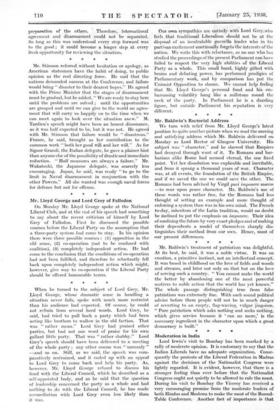Mr. Stimson referred _without hesitation or apology, as American statesmen
have the habit of doing, to public opinion as the real directing force. He said that the nations demanded success at the Conference, and failure would bring " disaster to their dearest hopes." He agreed with the Prime Minister that the stages of disarmament must be gradual, but he added, " We are ready to stay here until the problems are solved ; until the opportunities are grasped and until we can give to the world an agree- ment that will carry us happily on to the time when we can meet again to look over the situation anew." M. Tardieu's speech might have been an honest dissonance, as it was half expected to be, but it was not. He agreed with Mr. Stimson that failure would be " disastrous." France, he said, brought as her contribution to the common work " both her good will and her will." As for Signor Grandi, the Italian delegate, he gave a plainer hint than anyone else of the possibility of drastic and immediate reduction. " Half measures are always a failure." Mr. Wakatsuki, the Japanese delegate, was scarcely less encouraging. Japan, he said, was ready " to go to the limit in Naval disarmament in conjunction with the other Powers." All she wanted was enough naval forces for defence but not for offence.






































 Previous page
Previous page